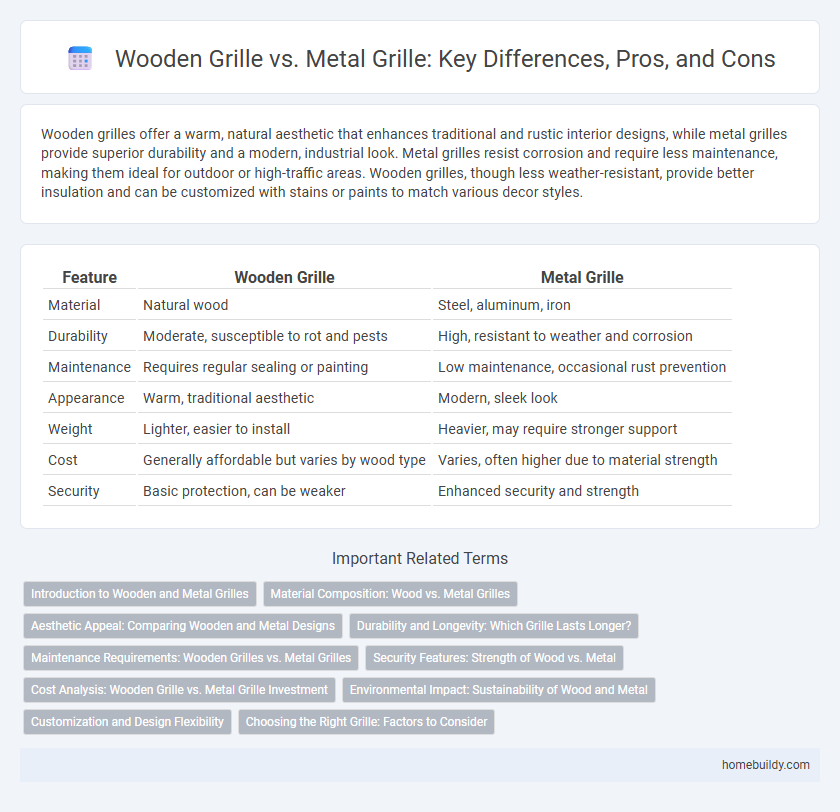Wooden grilles offer a warm, natural aesthetic that enhances traditional and rustic interior designs, while metal grilles provide superior durability and a modern, industrial look. Metal grilles resist corrosion and require less maintenance, making them ideal for outdoor or high-traffic areas. Wooden grilles, though less weather-resistant, provide better insulation and can be customized with stains or paints to match various decor styles.
Table of Comparison
| Feature | Wooden Grille | Metal Grille |
|---|---|---|
| Material | Natural wood | Steel, aluminum, iron |
| Durability | Moderate, susceptible to rot and pests | High, resistant to weather and corrosion |
| Maintenance | Requires regular sealing or painting | Low maintenance, occasional rust prevention |
| Appearance | Warm, traditional aesthetic | Modern, sleek look |
| Weight | Lighter, easier to install | Heavier, may require stronger support |
| Cost | Generally affordable but varies by wood type | Varies, often higher due to material strength |
| Security | Basic protection, can be weaker | Enhanced security and strength |
Introduction to Wooden and Metal Grilles
Wooden grilles offer natural aesthetics, warmth, and customization options, making them ideal for interior applications where design flexibility is key. Metal grilles provide superior durability, corrosion resistance, and strength, suitable for exterior and high-traffic areas requiring long-lasting performance. Both materials serve different functional and decorative purposes, influencing choice based on environmental conditions and stylistic preferences.
Material Composition: Wood vs. Metal Grilles
Wooden grilles are composed primarily of natural timber, offering warmth and a classic aesthetic while providing moderate durability and ease of customization through carving or staining. Metal grilles, typically made from aluminum, steel, or wrought iron, deliver superior strength, corrosion resistance, and low maintenance, making them ideal for secure and long-lasting installations. Choosing between wood and metal grilles depends largely on desired visual appeal, environmental exposure, and maintenance preferences.
Aesthetic Appeal: Comparing Wooden and Metal Designs
Wooden grilles offer a warm, natural aesthetic that enhances traditional and rustic interiors with their rich textures and organic tones. Metal grilles provide a sleek, modern appearance often favored in contemporary or industrial designs due to their smooth finishes and ability to be crafted into intricate patterns. Choosing between wooden and metal grilles depends on the desired style impact, where wood emphasizes warmth and metal highlights sophistication and durability.
Durability and Longevity: Which Grille Lasts Longer?
Wooden grilles offer a classic aesthetic but are prone to warping, rotting, and insect damage, reducing their durability over time. Metal grilles, especially those made from stainless steel or aluminum, provide superior resistance to weather, corrosion, and impact, ensuring longer longevity and minimal maintenance. Choosing metal grilles guarantees a more durable and long-lasting solution compared to wooden options in most environmental conditions.
Maintenance Requirements: Wooden Grilles vs. Metal Grilles
Wooden grilles require regular sealing or staining to prevent moisture damage, warping, and insect infestation, making maintenance more intensive than metal grilles. Metal grilles, especially those made from aluminum or stainless steel, resist rust and corrosion with minimal upkeep, typically needing only occasional cleaning to maintain appearance. The durability and lower maintenance of metal grilles make them a more practical choice for long-term exterior applications.
Security Features: Strength of Wood vs. Metal
Metal grilles offer superior security features due to their high tensile strength and resistance to cutting or bending, making them ideal for safeguarding homes and commercial properties. Wooden grilles, while aesthetically appealing and sturdy, are more susceptible to breakage or damage from impact and weather conditions, reducing their overall effectiveness for security purposes. For maximum protection, metal grilles typically provide enhanced durability and reliability compared to wood in security applications.
Cost Analysis: Wooden Grille vs. Metal Grille Investment
Wooden grilles typically require a lower initial investment, making them an affordable choice for budget-conscious projects, but they may incur higher maintenance costs due to susceptibility to rot and pests. Metal grilles, though more expensive upfront, offer greater durability and reduced long-term expenses owing to their resistance to weathering and minimal upkeep requirements. Evaluating the total cost of ownership over time reveals that metal grilles often provide better value despite their higher upfront price.
Environmental Impact: Sustainability of Wood and Metal
Wooden grilles offer a renewable and biodegradable option, reducing carbon footprint through carbon sequestration during tree growth and lower energy consumption in manufacturing. Metal grilles, typically made from aluminum or steel, require high energy for extraction and production but can be recycled indefinitely, promoting circular economy benefits. Choosing sustainably sourced wood or recycled metal enhances environmental responsibility in grille selection.
Customization and Design Flexibility
Wooden grilles offer exceptional customization with intricate carvings and varied finishes, allowing for unique, warm designs that blend seamlessly with traditional and rustic aesthetics. Metal grilles provide superior design flexibility through precise fabrication techniques like laser cutting, enabling modern, geometric patterns and enhanced durability. Both materials cater to different architectural styles, but wood excels in artisanal customization while metal stands out for structural versatility and contemporary appeal.
Choosing the Right Grille: Factors to Consider
When choosing between wooden and metal grilles, consider durability, maintenance, and aesthetic appeal. Wooden grilles offer a warm, customizable look but require regular upkeep to prevent rot and warping, ideal for traditional or rustic settings. Metal grilles provide strength and low maintenance, with options like aluminum and wrought iron enhancing security and modern design preferences.
wooden grille vs metal grille Infographic

 homebuildy.com
homebuildy.com